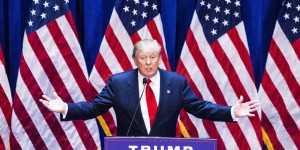Issues: Fake news
In the months following the election and inauguration of President Donald Trump, the term “fake news” has become one of the trademarks of his presidency. He has repeatedly used the phrase to describe negative press coverage of his administration and as a weapon to promote his anti-media beliefs. While it may be easy to laugh at his 3 a.m. Twitter rants, fake news is not a fake problem.
According to The Atlantic, misinformation dominates social media, and fake news reaches more people and spreads faster than stories with accurate information. A false story reaches, on average, 1,500 people six times faster than a true story. Fake stories out-perform truth in subjects from business and entertainment to science, terrorism and war. It’s often hard to determine what is real and what is not, and Donald Trump isn’t making it any easier. When he calls respected news organizations such as The New York Times “fake news,” he confuses Americans and makes it harder to distinguish real from fake. When he tells his supporters, “What you are seeing and what you are reading is not what’s happening,” the line between fact and fiction is blurred. To make matters worse, others have used fake news to build an empire based on lies.
Alex Jones is a conspiracy theorist and founder of InfoWars, a fake news website, known for his outrageous, and often false, claims. Some are harmless, like his claim that the U.S government is putting chemicals in water that turn frogs gay. However, he’s also promoted false claims that have had dangerous consequences. In 2016, InfoWars promoted a conspiracy theory that claimed Hillary Clinton was running a child sex-trafficking ring in the basement of Comet Pong Pizzeria in Washington, D.C. One of his listeners, Edgar Maddison Welch, believed the story, and fired multiple rounds into the pizzeria later that year. No one was hurt, and Welch was sentenced to four years in prison.
Despite the conspiracy theories and fake news, InfoWars has millions of subscribers, and Jones makes millions in advertising each year. He may have supporters, but the fight against him is gaining momentum.
In an April 2017 broadcast called “Sandy Hook Vampires Exposed,” Jones claimed the 2012 Sandy Hook shooting, which left 26 dead, was a staged hoax to promote gun control. He additionally claimed survivors of the shooting were crisis actors. Sandy Hook families have sued Jones for defamation, citing the comments he made in the broadcast. Eight families sued him alleging his followers have harassed them and his reports have led to immense pain. Facebook banned four of Jones’ pages and YouTube deleted his channel, which had 2.4 million subscribers at the time of its removal. However, Jones claims that the censorships will only make him stronger.
Whether it be through InfoWars or our president, the spread of misinformation is on the rise. And while it may be fun to laugh at some outrageous claims, the consequences of spreading false information is not #FAKENEWS.
What is being done:
To help stop the spread of fake news, social media sites have implemented policies that work to remove fake stories and videos, and Facebook works with Politifact and FactCheck to stop the spread of false information. Fighting fake news is hard, but the effects of the spread of misinformation can be limited with education and media literacy.
Your donation will support the student journalists of Kirkwood High School. Your contribution will allow us to purchase equipment and cover our annual website hosting costs.

Interests: Music, politics, podcasts.
Favorite musical artist: Can’t name just 1: Beyoncé, Taylor Swift, slayyyter, Kim Petras, gaga, Ariana grande,...










